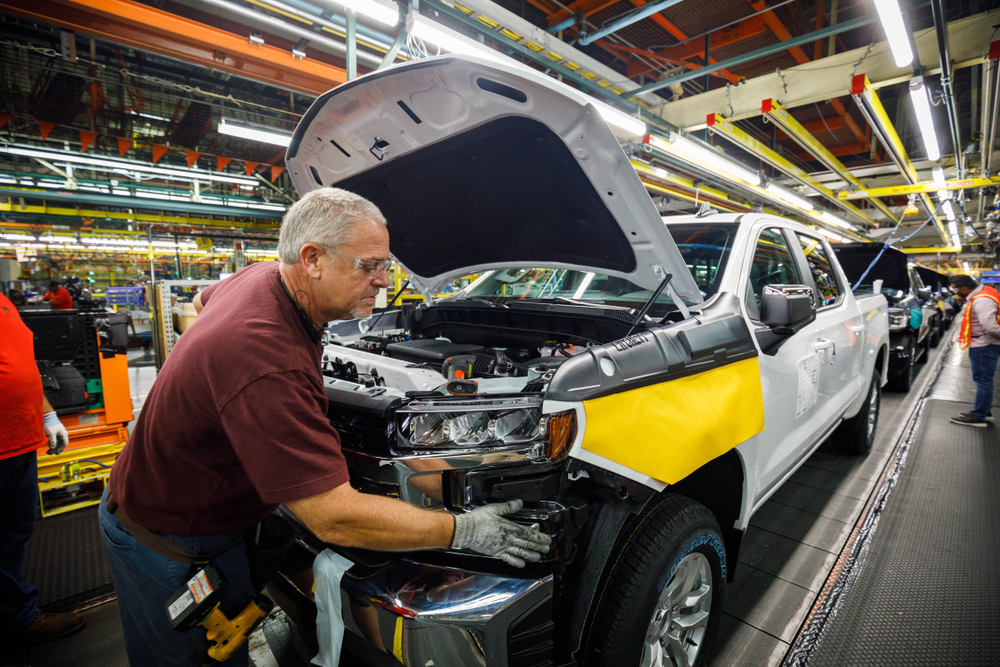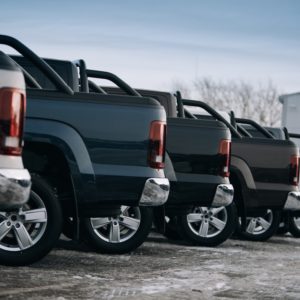Detroit automakers have announced plans for stopping production of most car models over the next few years.
By 2021, the Big Three will offer U.S. consumers fewer than seven car models, less than one-fifth the number they produced during 2011.
The Big Three is putting all of its “eggs” in the light truck basket. Light trucks represented over 80% of Big Three unit sales last year in the U.S., up from 66% of 2011 volume. By 2021, light trucks could reach 95% of Big Three unit sales in the U.S.
By focusing on light trucks, Detroit is doubling down on its most profitable and fastest growing sales segment in the U.S.
The Big Three will almost exclusively focus on the light truck market, where it has established its largest share and from which it has generated almost all of its profits in recent years.
Long-Term Risks
By chasing the short-term benefits of light truck profits, Detroit automakers are taking serious long-term risks.
First, Detroit’s light truck strategy might be at odds with the changing age mix of vehicle buyers in the U.S. Baby Boomers, once the heart and soul of the new vehicle market in the U.S., are being replaced rapidly by younger generations of car buyers, particularly Millennials (Americans born between 1980 and 2000).
Second, Millennials’ auto purchases are driven by different values than those sending Baby Boomers to Dealer showrooms.
Third, shifting economic conditions and spiking gas prices have, in the past, caused sudden and dramatic changes in the auto buying habits of Americans. For example, light trucks fell sharply in sales share following the 2008 Recession.
Once thought to be unenthused about vehicle ownership, Millennials are now cranking up their auto purchases.
Five years ago, Millennials accounted for about 25% of new vehicles purchased in the U.S. but by 2020 Millennials will be the largest new vehicle buyer group, replacing Baby Boomers.
Generation X buyers (Americans born between 1965 and 1979) will rank third in new vehicle 2020 market share.
Millennials and Baby Boomers Differ in Vehicle Buying Values
First, Millennial buyers generally prefer cars over light trucks. While eight of the top ten vehicle models purchased by Baby Boomers are light trucks, the opposite is true among Millennials, who have only three truck models in their top ten buying list.
Second, Millennial buyers want to spend less per vehicle than Baby Boomers. Millennials also want low cost of ownership. Cars deliver on both of these issues. They are cheaper than light trucks among entry level models, and they average greater fuel efficiency.

Third, Millennial buyers generally keep new vehicles for a shorter time than Baby Boomers. This means they will be returning to the new vehicle marketplace more often than Boomers, redoubling their impact on the new auto market.
Fourth, environmental concerns have a stronger impact on Millennials’ new vehicle selections than they do among Baby Boomers.
Pennywise and Pound Foolish
The Big Three could be making a pennywise and pound foolish blunder by shifting their production almost exclusively to light trucks over the next few years.
Not only could this be a fateful decision, it is one that cannot easily be reversed, since it would take years for Detroit to reintroduce cars into their production lines. In the fast-moving vehicle market, that is a lifetime.
No one can blame the Big Three for chasing profits. That is their mission. Nevertheless, they must keep an eye on the future, especially consumer buying trends. The failure to do so could put the Big Three in dire straits in the not-too-distant future, possibly unable to meet changing consumer demands in the vehicle market.
Key Issues Snapshot
- The Big Three is putting all of its “eggs” in the light truck basket, as they stop production of most car models over the next few years.
- Detroit automakers are chasing the short-term benefits of light truck profits, but they are taking on serious long-term risks that could have disastrous consequences for them.
- The Big Three risks abandoning Millennials, who are the growth base of the new vehicle market, for quick profits from light trucks.
- Millennials and Baby Boomers differ in their vehicle buying habits. Overall, Millennials prefer purchasing cars over light trucks as cars deliver on issues of greatest importance to Millennials more than light trucks do.
- Consumer preferences could shift away from light trucks to cars if the economy sours and gas prices soar.
- As the Big Three abandons passenger car production, foreign nameplates will have free play in this huge market sector that represented one-third of U.S. unit sales in 2018.
- Buyers (not only Millennials) who select new vehicles for environmental reasons prefer cars over light trucks.
- Detroit might be popping its seed corn by chasing the short-term promise of light truck profits at the risks of losing Millennial buyers and facing (sometime in the future) economic and pump-price conditions that make American buyers abandon light trucks
Any information provided on this Website is for informational purposes only and is not intended to replace consultation with a professional mechanic. The accuracy and timeliness of the information may change from the time of publication.













